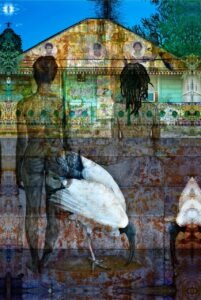
"The Visit", Michael Platt Pigment Print on Paper, 22 x 28 inches, 2014
This fall, the Sonja Haynes Stone Center for Black Culture and History, working with other campus and community organizations, will sponsor a groundbreaking project on history and cross-cultural collective memory(ies). This interdisciplinary project will shed new light on the history of the arrival of the first group of enslaved Africans to an English-speaking colony in what is now the United States and North Carolina. This project is distinguished by its focus on providing space for ‘conversations’ between invited participants, rather than lectures or panel discussions. This is why we have chosen to develop a project that highlights the themes of "freedom," "sense of place," and "home."
The project's basic objectives are:
- To stimulate and provide spaces for community (campus and beyond) conversations on the history, memory, and the central historical narrative about 1619;
- To provide resources, and guidance to locate resources, about the history, memory, and narratives that are part of the written record and the traditional narratives that exist outside of formal sources;
- To develop partnerships with organizations, groups, and institutions in the immediate region and support their efforts to participate in the project as partners and as sponsors of their own programs;
- To document the ideas and local and collective projects that develop with, or as a result of, this Collective Memory(ies) project.
The Collective Memory(ies) Project will invite ‘conversants’ from communities that were thrown together as a result of the slave trade and European colonialism in both Africa and the Americas. During a morning/afternoon symposium, Native/Indigenous Americans, African Americans, Africans, Europeans, and White Americans (descendants) will offer their unique insights and reflections on the 400th year since the eventful moment in 1619 when those enslaved Africans arrived at Point Comfort near the English settlement at Jamestown, in what is now Virginia.
A symposium will take place Monday, November 11, from 8:30 am to 3 pm and will feature 2 keynotes (morning and afternoon) that will serve as the foundation for the conversations that will take place between invited guests. Click here to RSVP
Participants include:
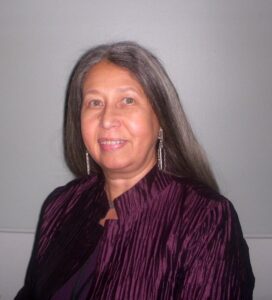
Chief Lynette Allston
Chief Lynette Allston: Lynette Allston is the Chief and Tribal Council Chair of the Nottoway Indian Tribe of Virginia, one of 11 Tribes officially recognized by the Commonwealth of Virginia. The primary focus of the Nottoway Indian Tribe
of Virginia has been to offer educational outreach and opportunities to close the gaps that exist in understanding the history and culture of the Nottoway Indians. She is co-author of the book entitled, DoTraTung, which offers a compelling look at the history, culture, and lifestyle of the Nottoway Indians. The Tribe’s Community House and Interpretive Center is located in Capron, Virginia. Chief Lynette resides in the place where she spent her formative years through high school, on the family farm in Drewryville, Virginia. A graduate of Duke University with a degree in History, she returned to Virginia after retiring from two decades of business ownership in South Carolina. She currently serves on the Board of the Virginia Museum of Fine Arts, Richmond, Virginia, is the past President of the Board of Rawls Museum Arts, Courtland, Virginia, and is Chair of the Virginia Indian Advisory Board for the Commonwealth of Virginia and is a commissioner on the Southampton County VA Planning Commission. She created and operates the Artisan Market in Capron, VA as a free venue for local artisans and craftsmen to sell their creations. In 2018, she was one of the "50 for 50" Inspiration Award recipients from the Virginia Commission for the Arts. She is featured in “Virginia Voices”, a film about Virginia’s people currently presented in the permanent exhibit at the Virginia Historical Society, Richmond, Virginia.
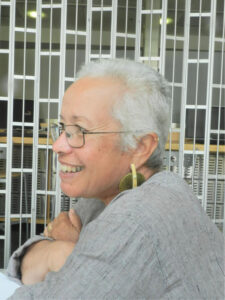
Ann Chin
Ann Chin: Ann Chin was born and raised in Washington, DC, among family and friends with a strong awareness of history. Over the years, she became a person who loves stories and the people who generate these narratives. Along the way, she also realized that each of us is deeply entwined with a local and national heritage that can be traced through memory as well as knowledge. Textile art, social service, community organizing, and historical research are the constants in her life. Married to journalist and author, Charlie Cobb, she appreciates language, written and spoken. From parents and many relatives, she has learned the responsibility of honesty, humor, and community. Being a member of a diverse and ever-expanding family of three children, five grandchildren, and numerous cousins, Chin increasingly appreciates the role we all have in telling the story, in valuing who we are and who helped shape us, and in acknowledging that process. In 2011, she established the Middle Passage Ceremonies and Port Markers Project, a national non-profit organization dedicated to honoring African ancestors who experienced the Middle Passage – those who died and those who survived from whom we are descended. www.middlepassageproject.org.
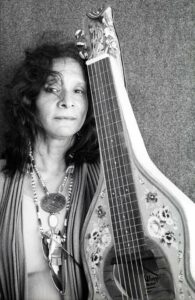
Pura Fe Crescioni
Pura Fe Crescioni: Although born and raised in New York City, Pura Fé has chosen to lay her guitars in Saskatchewan, Canada. Pura Fé, an heir to the Tuscarora Indian Nation, is an artist, an activist, and much more. She draws a large part of her inspiration from her rich First Nation heritage. The “sacred seed” that gave its title to her latest album is as much about First Nation legends as it is about Monsanto and GMOs. “I’m often labeled as an activist. I place myself in the time-honored perspective of someone who accepts to bear the responsibilities inherited from my ancestors. It urges me to fight for the rights of indigenous people and denounce the threats to the environment, starting with oil and shale gas corporations.”Her musical journey, from folk to mainstream through an artful use of the blues, reflects the concerns of an artist who grew up in the Motown era while citing Buffy Sainte-Marie, Charley Patton, and Joni Mitchell as her true mentors. And, more widely, “traditional music from all over the world, wherever the spirit is connected to our roots.”
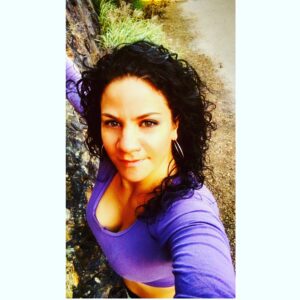
Jessica A. Krug
Jessica A. Krug: Jessica A. Krug is a historian of Black politics, imagination, gender, and cultural practices, with a particular interest in West Central Africa and maroon societies and Black transnational cultural studies. Her book, Fugitive Modernities: Kisama and the Politics of Freedom (Duke University Press, 2018), a finalist for the 2019 Harriet Tubman Book Prize, interrogates the political practices and discourses through which those who fled from slavery and the violence of the slave trade in Angola forged coherent political communities outside of, and in opposition to, state politics. She then follows these practices, discourses, and ideologies across the Atlantic, investigating their use in seventeenth-century maroon (fugitive) communities in Brazil and Colombia. This book ends with a consideration of the relationship between resistance, non-state politics, and the politics of the present across Africa and the African Diaspora. Her next book, Fathers of No Nation, explores the relationship between seminal fugitive/resistance leaders and the gendered politics of authority and state in São Tomé, the Dominican Republic, Haiti, Brazil, and Jamaica from the sixteenth century through the present. Prof. Krug has also written on hip hop, politics, and gender in both Angola and New York City, as well as the transnational ritual idioms of politics in Jamaican Maroon societies in the eighteenth century. She is deeply interested in intellectual histories of those who never wrote documents and the use of embodied knowledge for both research and teaching. She is a member of the KR3TS Dance Company (NYC), a Copwatcher, prison abolitionist, and writer for RaceBaitr.
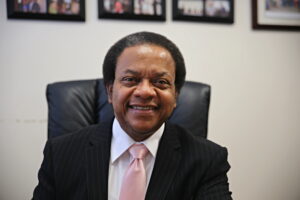
Freddie L. Parker
Freddie L. Parker: Dr. Freddie Parker was born and reared in Hillsborough, North Carolina. He received the B.A. in History from North Carolina Central University in 1975, the M.A. in History from NCCU in 1977, and the Ph.D. in American History from UNC-Chapel Hill in 1987. He is currently Professor Emeritus of History at North Carolina Central University in Durham, N.C. He is the author of Running for Freedom: Slave Runaways in NC, 1775-1840, and Stealing a Little Freedom: Advertisements for Slave Runaways in NC, 1791-1840. On November 19, 2008, Dr. Parker was appointed by Governor Mike Easley to the then newly-created African American Heritage Commission. In January 2011, Governor Beverly appointed him Chair of the Commission. He was appointed by Governor Mike Easley to the North Carolina Historical Commission in 2001 and reappointed in 2007; he is past chairman of the North Carolina Historical Highway Marker Commission; currently, he is a member of the Board of the African American History Project Advisory Board at Tryon Palace in New Bern; a member of the Historical Society of North Carolina, and the North Carolina Society. He appeared on several PBS and BBC television specials, including: Why Celebrate Juneteenth, Reparations for Slavery, Blacks in Civil War North Carolina, Blacks in Reconstruction North Carolina, Slavery in North Carolina, The Residual Effects of Slavery, and Slavery in the Making of America for The University of North Carolina Center for Public Television, and The Gospel Truth for the British Broadcasting Company. In 2013, Dr. Parker received the Christopher Crittenden Award for his career contributions to the historical profession in North Carolina. He is a recipient of the UNC Board of Governors Excellence in Teaching Award, and a member of the Phi Alpha Theta History Honor Society and the Pi Gamma Mu International Honor Society in the Social Sciences.

Alan Rice
Alan Rice: Alan Rice is Professor in English and American Studies at the University of Central Lancashire, Preston. He has worked on the interdisciplinary study of the Black Atlantic for the past three decades, including publishing Radical Narratives of the Black Atlantic (Continuum, 2003) & Creating Memorials, Building Identities: The Politics of Memory in the Black Atlantic (Liverpool UP, 2010). In May 2014, he launched as co-director, the Institute for Black Atlantic Research (IBAR) at UCLAN. He was a founder member of the Slave Trade Arts Memorial Project (STAMP) in Lancaster, which was responsible for unveiling the first quayside memorial for victims of the slave trade, co-curated Trade and Empire: Remembering Slavery at the Whitworth Gallery Manchester in 2007 and has been consultant and talking head on a variety of documentaries on slavery and its aftermath with the BBC and other broadcasters. His latest co-written monograph, Inside the Invisible: Memorialising Slavery and Freedom in the Life and Works of Lubaina Himid, will be published by Liverpool University Press in October 2019 and is the first academic monograph on the 2017 Turner Prize Winner.
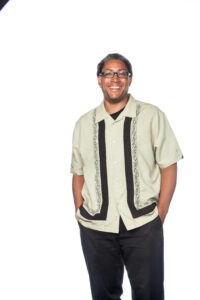
Neil Roberts
Neil Roberts: Neil Roberts received his Ph.D. in Political Science from The University of Chicago with a specialization in political theory. A high school teacher, debate coach, and NCAA Division 1 soccer player at Brown University prior to graduate school, Roberts is the recipient of fellowships from the Andrew W. Mellon Foundation, Social Science Research Council, and Woodrow Wilson National Fellowship Foundation as well as a member of the Caribbean Philosophical Association Board of Directors. His present writings deal with the intersections of Caribbean, Continental, and North American political theory with respect to theorizing the concept of freedom. Prof. Roberts is President of the Caribbean Philosophical Association (2017-) and, as of July 1, 2018, the W. Ford Schumann Faculty Fellow in Democratic Studies.
In addition to the symposium element of the project, we will also sponsor:
(1) an exhibition of works entitled DO or DIE: Affect, Ritual, Resistance by artist Fahamu Pecou, that has been organized by the Halsey Institute of Contemporary Art and installed in the Robert and Sallie Brown Gallery and Museum in the Stone Center;
(2) the Fall 2019 Diaspora Festival of Black and Independent Film will focus on themes that illuminate the legacies of 1619 and;
(3) an exhibition of panels entitled 1619: First Arrival of Africans, on loan from the Hampton History Museum and on display at the Chapel Hill Public Library through Nov. 18.
We are also co-sponsors for Cash Crop!, an installation by Durham artist Stephen Hayes, on display in Downtown Chapel Hill at 109 East Franklin Street. This exhibition features 15 life-sized sculptures of enslaved Africans, in shackles and chained to a shipping pallet; the art invites viewers to reflect on the humanity of enslaved Africans and the human-scale tragedy of the Transatlantic Slave Trade.
The 1619 Collective Memory(ies) Project is supported by:
American Indian Center
Carolina Black Caucus
Carolina Public Humanities
Center for African Studies
Center for Civil Rights
Center for Dramatic Art
The Center for the Study of the American South
Chapel Hill Public Library
Department of African, African American, and Diaspora Studies
Department of Communication
Hampton History Museum
Halsey Institute of Contemporary Art at the College of Charleston
Institute for the Arts and Humanities
The Office of the Provost
The Office of the Chancellor
Orange County Community Remembrance Coalition (OCCRC)
Stanford L. Warren Branch Library (Durham County Library)
Stone Center Library